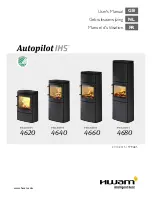
41
8.3
CLEANING THE ASH PAN
The ash pan should be emptied when necessary. The thermo-stove
or insert should not be working without having the ash pan inside (
see
drawing D33 and D34
).
8.4
ASH PAN DOOR AND COMBUSTION CHAMBER SEALS
The seals ensure the thermo-stove air tightness and, thus, a proper
performance (
see drawing D35
).
It is necessary to check them regularly; if they are worn-out or damaged
they should be replaced immediately. You can find ceramic cord and
self-adhesive fibre at the same Bronpi distributor where you bought your
insert or thermo-stove.
These operations should be done exclusively by an authorised technician.
An authorised technician must do the maintenance at least once a year.
8.5
CLEANING THE CHIMNEY
When the pellet is burnt slowly, it produces tar deposits and other organic vapours that combined with the
humidity to create soot (creosote). An excessive accumulation of soot may cause problems in the smoke
outlet and the flue may catch fire if not maintained.
The cleaning should only be made when the equipment is cold. A chimney sweep should perform this task
and, at the same time, examine the smoke duct (it is recommended to write down the dates of every cleaning
and keep a register of them).
8.6
CLEANING THE GLASS
IMPORTANT:
Clean the glass only when it is cold in order to avoid possible explosion. You can use specific products. You can find
Bronpi vitroceramic-cleaning product at the same Bronpi distributor where you bought your stove (see drawing D36).
BREAKAGE OF GLASSES. The glasses, as they are vitroceramic, resist until 750ºC and they are not subject to thermal
shocks. The breakage can only be caused by mechanical shocks (crashes or violent closing of the door, etc). Therefore,
its replacement is not included in the warranty.
8.7
EXTERNAL CLEANING
Do not clean the external surface of the thermo-stove or insert with water or abrasive products because they
may damage the product. Use a feather duster or a rag a bit wet.
8.8
CLEANING THE RESERVOIRS
To keep the validity of the guarantee it is mandatory to do the register cleaning by an technician authorised by
Bronpi Calefacción, who will write down the statement made.
It involves cleaning the ash reservoir of your thermo-stove or insert such as smoke zones.
First of all whole inside of the combustion chamber must be cleaned, soot removed from chamber walls
because this makes thermal efficiency higher, the surfaces need to be brushed thoroughly with a wire brush
to clean of the dirt (
see drawing D37
).
In models Clara Hydro and Cleo Hydro it is also necessary to clean the heat exchanger chamber, because
the soot makes it difficult for the smoke to circulation. To access to this zone you must remove the top of the
thermo-stove and then do the next operations:
-
Unscrew the screws on each side of the cover existent on the top of the thermo-stove to access to the register.
Drawing D38.
-
Unscrew the screws to remove the reservoir cover.
Drawing D39.
-
Clean the ashes deposited on the top.
Drawing D40.
-
Replace all the pieces and check the seal integrity of the
reservoir.
When the top is clean, we have to clean the ash reservoir placed on
the bottom of the thermo-stove. To do it, it is necessary to remove
the lower decorative plate (depending on the thermo-stove model
instead of this decorative plate you will find the front chamber) (
see
drawing D41
) and then, do the next operations:
-
Remove the reservoir cover unscrewing the different screws
(
see drawing D42
).
-
Clean the ashes deposited on the reservoir, decaling the soot
deposited.
-
Cleaning the extractor forks and case. Remove the extractor if
necessary (
see drawing D43
).
-
Replace the pieces.
-
Check the seal integrity of the reservoir.
In the model Alpes Hydro to access to the smoke duct we have to
open the trap placed on the frontal lower side (
see drawing D44
) and vacuum all the dirtiness if it is necessary, you can remove the scrapers
and the lower part of the insert by unscrewing the ash reservoir. This cleaning must be made when the insert is turned off and cold.
D35
D36
D37
D38
D39
D40
D41
D33
D34
INSTALLATION, OPERATING AND SERVICING INSTRUCTIONS
HYDRO SERIES RADIOFREQUENCY
EN
Summary of Contents for hydro series
Page 133: ...132 11 1 ALPES HYDRO FT...
















































